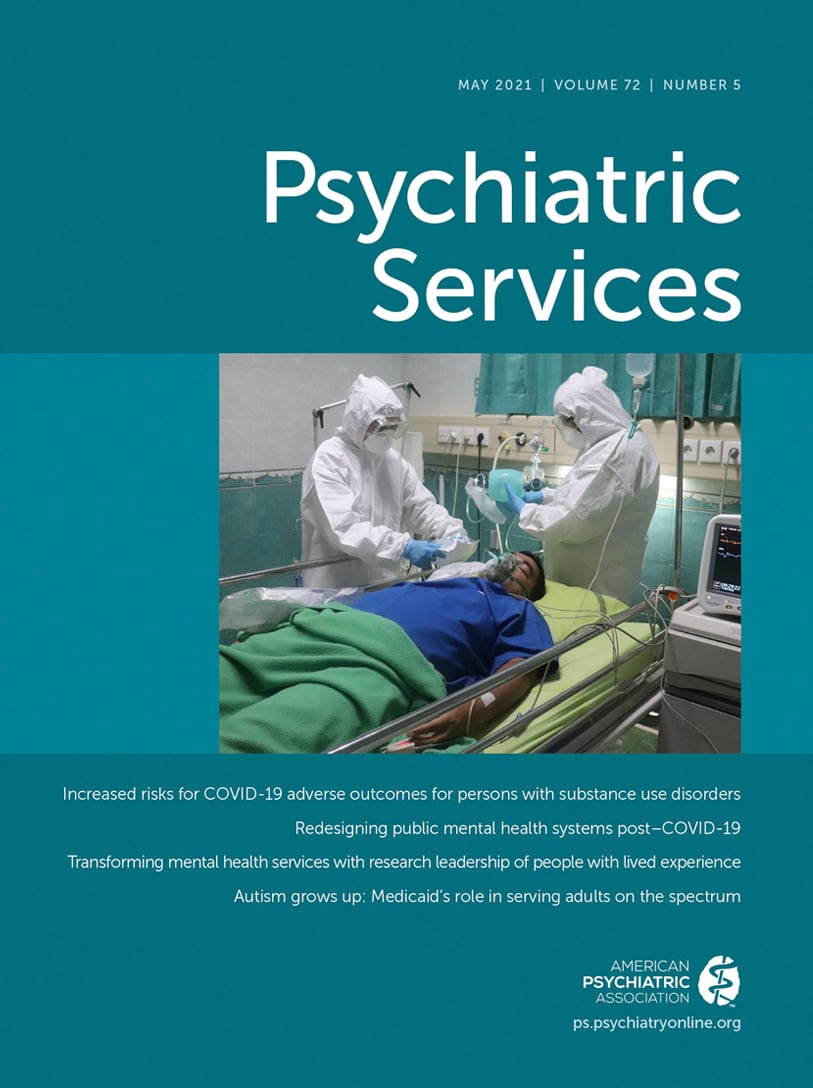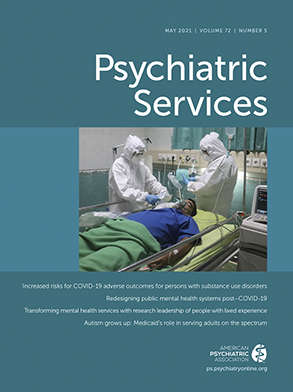Receiving a diagnosis of schizophrenia can be challenging and may be associated with fear and confusion (
1). Around the time of diagnosis, patients with first-episode psychosis (FEP) and their families may encounter high levels of stigma and misinformation regarding symptoms, disease course, and prognosis (
1). Both stigma and misinformation are associated with worse outcomes, including longer duration of untreated psychosis (
2) and poor adherence to treatment recommendations (
3).
Psychoeducational interventions can empower patients and family members to better manage and cope more effectively with psychiatric symptoms (
4,
5). For individuals with schizophrenia-spectrum disorders, psychoeducation has been shown to improve medication adherence (
4) and reduce rehospitalization rates (
4,
6). Research exploring psychoeducation for patients with FEP is less robust and focuses primarily on outpatients, although some studies have suggested benefits for family psychoeducation specifically (
7,
8). Only one study was identified that examined FEP-specific psychoeducation delivered in the inpatient setting, which described an intervention provided to caregivers only and was perceived as helpful (
9). Favrod et al. (
10) describe a four-session intervention designed for hospitalized patients with FEP, rather than caregivers. However, the efficacy of this intervention has not been examined in a clinical trial.
Considerable research has focused on coordinated specialty care for patients with FEP, which typically includes patient and family psychoeducation. The Recovery After an Initial Schizophrenia Episode (RAISE) Early Treatment Program study, which included patient and family psychoeducation as one of the four core interventions, found that the RAISE intervention is associated with improved quality of life and psychopathology (
11). Additionally, a meta-analysis of 10 randomized controlled trials comparing early intervention services to treatment as usual for early-phase psychosis found that these programs were superior to usual care in numerous domains (
12). Although it is not possible to infer a direct relationship between psychoeducation and improved outcomes in these studies, psychoeducation represents a critical component that contributes to these positive results.
Although psychoeducation for patients with FEP and their families is consistently recommended in the literature and guidelines (
13), the content, timing, and format of the intervention have not been well defined, and there is a paucity of research on inpatient interventions for this population. This is a notable gap, given that many patients with FEP are first diagnosed when hospitalized. Hospitalization for FEP is often one’s first exposure to mental health care, and these early experiences with providers can inform attitudes toward treatment. Furthermore, appropriate psychoeducation and family engagement may help facilitate successful linkage with outpatient follow-up, which has been shown to be as low as 35% in some studies (
14).
The aim of this study was to characterize how psychoeducation is currently being provided to inpatients with FEP and their families by conducting an online survey. We hypothesized that most psychiatrists are educating patients and their families primarily through unstructured conversation rather than by utilizing uniform educational materials.
Methods
A survey investigating how clinicians conduct psychoeducation for hospitalized patients with FEP and their families was posted on Google Forms from May 21 through July 30, 2018. Topics within the survey included psychoeducation content, method of delivery, timing, and duration. Questions were adapted from a previous study in which psychiatric institutions in Europe were surveyed about psychoeducation provided to patients with schizophrenia (
5). The survey was reviewed by a group of experts in the field of FEP at the authors’ home institution. The survey consisted of 19 multiple-choice questions, comprising 11 single-select and eight multiselect questions, and had two open-ended questions. Few respondents answered the open-ended questions, so standardized coding was not used for responses to these questions.
An e-mail was sent to program directors (N=196) and coordinators (N=242) at 247 psychiatry residency programs in the United States, requesting that they forward the survey link to their trainees and inpatient-attending psychiatrists. This population was selected because it represented a sample of psychiatrists across the country and because residency contact information was most readily available. Contacts were obtained from official residency websites and from Doximity (
www.doximity.com). A similar e-mail was sent to 131 early psychosis treatment centers listed on Strong365, a mental health advocacy organization.
All respondents were provided with information regarding the survey’s focus and purpose. Respondents were offered the opportunity to enter their e-mail address in a raffle to win a free iPad Mini. Written informed consent and institutional review board approval were waived, as no protected health information was collected. Survey responses were analyzed with descriptive statistics.
Results
In total, 167 providers completed the survey, 148 (89%) of whom identified as psychiatry trainees, and 17 (10%) identified as attending psychiatrists (two providers [1%] did not indicate their professional status); 162 respondents (97%) reported their home institutions, representing 41 hospitals across 20 states. (A table listing the survey respondents by state and institution is available as an online supplement to this report.) The most frequently identified institution was Zucker School of Medicine at Hofstra/Northwell (18%, N=29), followed by New York Presbyterian–Columbia University Medical Center (6%, N=10). The most frequently identified state was New York (43%, N=70). Given the uneven distribution of respondents, weighted heavily toward psychiatry trainees in New York City (NYC), the analysis described in the following focused on this subgroup (86%, 60 of 70 respondents) that excluded New York respondents from institutions outside NYC (N=5) and attending psychiatrists (N=5).
Of these 60 respondents from NYC, most reported that they provide psychoeducation to patients with FEP (98%, N=59) and their families (97%, N=58) during inpatient hospitalization. How they provided psychoeducation to patients and their families is shown in
Table 1. (See also the
online supplement.) Among those who provide psychoeducation, >80% (81% for patients and 84% for families) indicated that the content and delivery method was not uniform but rather varied on the basis of the individual’s needs and interest. The most frequently used method of providing psychoeducation was unstructured conversation (98%), followed by handouts (25% for patients and 26% for families) obtained online from the National Alliance on Mental Illness or UpToDate. Other methods, including worksheets, verbal presentations, and videos, were used infrequently.
Respondents most frequently indicated that they conducted two psychoeducational sessions with the patient (42%, N=25) and one (45%, N=26) or two (43%, N=25) that included the patient’s family. These sessions were most commonly conducted individually (97%, N=57 for patients; 86%, N=50 for families) rather than in a group setting. Most sessions (93%, N=55 for patients; 81%, N=47 for families) were reported to be ≤30 minutes long.
Results from the full national sample (N=167) revealed similar trends, with approximately 95% of respondents reporting that they provided psychoeducation to patients with FEP and their families and approximately 87% reporting that the content and delivery method were not uniform (
Table 1). Those who did not provide psychoeducation to patients (5%, N=8) or families (6%, N=9) cited lack of time, staff, or psychoeducational materials as barriers to psychoeducation.
Discussion
In this study, we sought to characterize the delivery of psychoeducation to inpatients with FEP and their families. Our results indicate that most trainees at NYC hospitals were providing some form of psychoeducation to this population. However, few utilized a standardized psychoeducational tool or method, and only about 25% incorporated supplemental materials. Instead, most relied on unstructured conversation. Although this method has benefits such as the ability to tailor the information to the individual needs of each patient and family, it relies on the expertise of the clinician, time available, and the level of interest displayed by patients and their family members. Additionally, the absence of routine use of supplemental materials is notable, given that multimodal and interactive education is generally deemed more effective than traditional didactic methods (
15). Overall, these results, in addition to the national sample that showed similar trends, indicate that inpatient psychoeducation is largely informal and that patients with FEP and their families are not receiving consistent content and quality of information.
The results also indicate that clinicians were providing substantially less psychoeducation than is typically described in the literature. Respondents reported that they provided one to two psychoeducational sessions that lasted on average ≤30 minutes. Most of the literature we identified examines psychoeducational interventions that are implemented in several 30- to 60-minute sessions provided over a few weeks, and even those interventions that are designed to begin during hospitalization are significantly longer than what was reported in our survey (
9,
10).
Other notable findings include the predominance of individual sessions, rather than group sessions. Individual sessions are valuable, particularly for individuals with FEP, as they provide an opportunity for patient- and family-specific education in a confidential setting. However, the infrequency of a group format is noteworthy, given that group psychoeducation has been associated with reduced feelings of isolation in family members (
8). Furthermore, two content areas surrounding stigma, prevalence and the emotional effect of psychosis, were among the least frequently addressed topics. Taken together, these findings may represent a missed opportunity to address stigma and negative attitudes toward treatment, which have been shown to be associated with poorer outcomes (
2,
3).
Although infrequently, several respondents reported that they did not provide any form of psychoeducation during inpatient hospitalization, most commonly citing lack of time, staff, or materials as barriers. This is concerning, given that patient and family psychoeducation is considered a core component of the standard of care. Such findings necessitate further inquiry into these barriers so that all patients with FEP have access to relevant information and support.
Several limitations should be noted. First, we could not determine the total number of psychiatrists who received the survey link or the proportion of those who responded. Therefore, it is possible that this sample was not representative of all psychiatrists who treat patients with FEP. Additionally, the national sample was skewed, with NYC trainees most heavily represented. In an effort to address this limitation to generalizability, we focused the analysis on results from this respondent subgroup. Notably, the analysis of the national sample yielded similar results in almost all domains, suggesting that the results may, in fact, reflect national trends.
Furthermore, although results were analyzed at the individual provider level, most respondents were clustered around a handful of institutions, raising the concern that individual responses were not statistically independent. Of note, there were not enough respondents from each hospital to enable a meaningful comparison of institutional trends. Another limitation was that this survey captured only the perspectives of psychiatrists and did not elicit information from other inpatient staff who may also provide psychoeducation. Our results might therefore represent only a portion of the psychoeducation that is provided during hospitalization.
Conclusions
Despite the study’s limitations, the results raise the concern that patients with FEP and their families are not routinely receiving standardized and effective psychoeducation during hospitalization. Lack of psychoeducation during the acute phase of illness might lead to misinformation and poor insight, which can contribute to negative outcomes (
2,
3). In addition, the results highlight an opportunity to improve care for patients with FEP. A standardized intervention delivered in the hospital at the time of diagnosis would ensure that all patients and families receive consistent and effective psychoeducation.

